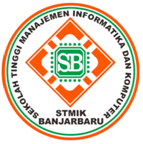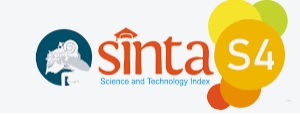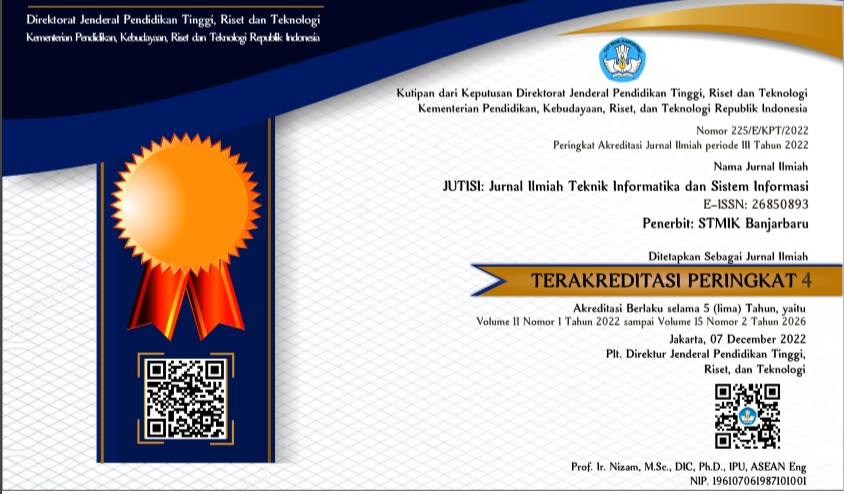Analisis Pengaruh Kesukesan Sistem Informasi Mahasiswa Menggunakan Model DeLone and McLean
Abstract
University of Hayam Wuruk Perbanas Surabaya's Student Information System (SIMAS) is an online-based information system designed to meet the various minimum requirements needed in lecture information processing activities, starting from the process of collecting, inputting, and processing data on academic information systems. In operation, some information is often not updated quickly, such as when entering a thesis title but does not appear when searching for data. This study aims to measure the factors that influence the success of SIMAS and examine the relationship between variables on net benefits. The research model used is the Information System Success Model 2003, with six measurement variables, namely: information quality, system quality, service quality, intention to use, user satisfaction, and net benefits. The research involved 304 active students as respondents. The results showed that the information quality and user satisfaction variables were significant for the intention to use variable, while the information quality and system quality variables were significant for the user satisfaction variable, the system quality variable and the user satisfaction variable were significant for the net benefits variable.
Keywords: Information system success model; Net benefit, DeLone and McLean
Â
Abstrak
Sistem Informasi Mahasiswa (SIMAS) Universitas Hayam Wuruk Perbanas Surabaya merupakan sistem informasi berbasis online yang dirancang untuk memenuhi berbagai persyaratan minimum yang dibutuhkan dalam kegiatan pengolahan informasi perkuliahan, mulai dari proses pengumpulan, input, dan pengolahan data pada sistem informasi akademik. Dalam pengoperasiannya, beberapa informasi sering tidak ter-update secara cepat, seperti pada saat memasukkan judul skripsi namun tidak muncul ketika di lakukan pencarian data. Penelitian ini bertujuan untuk mengukur faktor-faktor yang mempengaruhi kesuksesan SIMAS dan menguji hubungan antar variabel terhadap net benefit. Model penelitian yang digunakan adalah Information System Success Model 2003, dengan enam variabel pengukuran yaitu: information quality, system quality, service quality, intention to use, user satisfaction, dan net benefist. Penelitian melibatkan 304 mahasiswa aktif sebagai responden. Hasil penelitian menunjukkan variable information quality dan user satisfaction signifikan terhadap variable Intention to use, sedangkan variable information quality dan variable system quality signifikan terhadap variable user satisfaction, variable system quality dan variable user satisfaction signifikan terhadap variable net benefits.
Â
Keywords
References
W. utami, “Analisa Kesuksesan Sistem Informasi Akademik (SIAKAD) di pergururan Tinggi negeri dengan Menggunakan D & M IS Success Model,†J. Sist. Inf., p. 316, 2013.
Hudiniah, “Sistem Informasi Akademik Berbasis Client Server (Studi Kasus: Madrasah Tsanawiyah An-Nizhamiyyah Cileungsi),†Fak. Sains Dan Teknol. Univ. Islam Negeri Syarif Hidayatullah Jakarta, 2011.
N. H. H. M. Hasan, HI Baharum, GN Samy, N. Maarop, WZ Abidin, “Developing a success model of Research Information Management System for research affiliated institutions,†Int. Conf. Res. Innov. Inf. Syst, pp. 1–6, 2017.
D. Bunker, “Institutional Repository Research on information systems failures and successes: status update and future directions Research on Information Systems Failures and Successes,†Status Updat. Futur. Dir., 2015.
E. R. DeLone, W. H., McLean, “The DeLone and McLean Model of Information Systems Success : A Ten-Year Update,†J.Manag, vol. 19(4), pp. 9–30, 2003.
I. Hastuti, et al., “The User Satisfaction Level of E-Learning for Business and Management Subjects Based on Technology Acceptance Modelâ€, International Journal of Economics, Business and Accounting Research (IJEBAR), vol. 3, issue 3, pp. 185-195, 2019
N. L. D. Gitajayanti, I. P. Satwika dan A. I. I. Paramitha, “Evaluasi Sistem Informasi Skripsi dan Tugas Akhir STMIK Primakara (PRISKA) Menggunakan Metode User Experience Questionnaire,†Kumpulan Artikel Mahasiswa Pendidikan Teknik Informatika (KARMAPATI), vol. 10, no. 1, pp. 59-67, 2021.
L. Retnawati, “Analisis Kepuasan Pengguna Terhadap Kualitas Layanan Sistem Informasi Di Universitas XYZ,†SCAN - J. Teknol. Inf. dan Komun., vol. 13, no. 2, pp. 1-6, 2018.
A. Sinnun, “Analisis Kepuasan Pengguna LMS Berbasis Web,†J. Inform., vol. 4, no. 1, pp. 146–154, 2017.
S. Robo, D.B. Setyohadi, & A.J. Santoso, An identification of success of academic system application using Delone and McLean design (Case study at Wira Husada school of health science Yogyakarta). In 2018 International Conference on Information and Communications Technology (ICOIACT), pp. 827-832, 2018. IEEE.
A. Santos, A.J. Santoso, & D.B. Setyohadi, The analysis of academic information system success: A case study at Instituto Profissional de Canossa (IPDC) Dili timor-leste. In 2017 International Conference on Soft Computing, Intelligent System and Information Technology (ICSIIT), pp. 196-201, 2017. IEEE
A. J. S. Robo S, Djoko Budiyanto Setyohadi, “An Identification of Success of Academic System Application Using Delone and McLean Design,†Inf. Commun. Technol. (ICOIACT), 2018 Int. Conf., 2018.
N. Kock, Advanced mediating effects tests, multi-group analyses, and measurement model assessments in PLS-based SEM. 2014.
Sugiyono, Metode Penelitian Kombinasi (Mix Methods. Yogyakarta: ANDI, 2015.
Y.-W. L. Y.-S. Wang, “Assessing eGovernment systems success: a validation of the DeLone and McLean model of information systems success,†Gov. Inf. Q. 25(4), pp. 717–733, 2008.
Y.-S. Wang, H.-Y. Wang, and D.Y. Shee, “Measuring e-learning systems success in an organizational context: scale development and validation,†CHB 23, pp. 1792–1808, 2007.
G. R. N. Urbach, S. Smolnik, “An empirical investigation of employee portal success, J. Strateg,†Inf. Syst. 19, pp. 184–206, 2006.
R. K. S. Ozkan, “Multi-dimensional students’ evaluation of e-learning systems in the higher education context: an empirical investigation,†Comput. Educ. 53, pp. 1285–1296, 2009.
B. D. I. Balaban, E. Mu, “Development of an electronic Portfolio system success model: an information systems approach,†Comput. Educ. 60, pp. 113–122, 2013.
H.-C. C. C.-M. Chiu, C.-S. Chiu, “Examining the integrated influence of fairness and quality on learners’ satisfaction and Web-based learning continuance intention,†Inf. Syst. J. 17, pp. 271–287, 2012.
A. Hassanzadeh, F. Kanaani, and S. Elahi, “A model for measuring e-learning systems success in universities,†Expert Syst. Appl. 39, pp. 10959–10966, 2012.
H.-F. Lin, “Measuring online learning systems success: applying the updated DeLone and McLean model,†Cyberpsychol. Behav, pp. 817–820, 2007.
M. Sholihin and D. Ratmono, ANALISIS SEM-PLS DENGAN WARPPLS 3.0 UNTUK HUBUNGAN NONLINIER DALAM PENELITIAN SOSIAL DAN BISNIS. PEKANBARU: CV.Andi Offset, 2013.
I. Ghozali, Aplikasi Analisis Multivariate Dengan Program IBM SPSS 20 -6/E. Semarang: Badan Penerbit Universitas Diponegoro, 2012.
How To Cite This :
Refbacks
- There are currently no refbacks.











